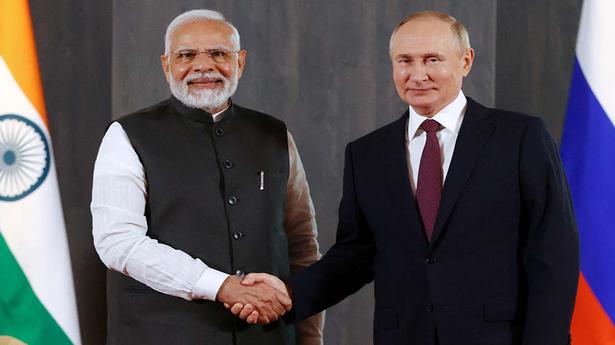
A summit in Samarkand; a retreat from Kharkiv
The Hindu
It was the first major multilateral conference Russian President Vladimir Putin attended since he or
It was the first major multilateral conference Russian President Vladimir Putin attended since he ordered the Ukraine invasion on February 24. It was the first foreign trip by Chinese President Xi Jinping in 32 months. It was the first time Prime Minister Narendra Modi came face to face with Mr. Xi since the 2020 border clashes between India and China. So in many ways, last week’s Shanghai Cooperation Organisation (SCO) summit in Samarkand, Uzbekistan, drew in great international attention. It didn’t go in vain.
Prime Minister Modi did not have bilateral meetings with Mr. Xi or Pakistan Prime Minister Shehbaz Sharif. But Mr. Putin had separate meetings with both Mr. Xi and Mr. Modi—and both leaders expressed their concerns about the Ukraine war and the Russian leader acknowledged those concerns. Mr. Modi, in his opening remarks, told Mr. Putin that “now is not the era of war”. His comments were not surprising given that India had expressed its concerns in the past as well. India’s discomfort with the war was hardly a secret. It had called several times for a negotiated end to the conflict and supported independent inquiry into allegations of war crimes. But at the same time, India had stayed away from publicly rebuking Russia and refused to join the West-led sanctions. At the SCO talks, what Mr. Modi did was to express his concerns directly to Mr. Putin, without making any changes to his government’s policy towards Russia. Mr. Putin responded to him by saying, “We want all of this to end as soon as possible. We will keep you abreast of what is happening there”.
While better regional connectivity remains one of the listed goals of the SCO, Mr. Modi said at the conference that it would be achieved only if members grant each other “full transit rights”, referring to Pakistan’s refusal to give India transit trade access by land to Afghanistan and Central Asia. The SCO looks like a formidable regional grouping on paper — two of its members are UNSC permanent members and four are nuclear powers. The grouping also covers some 40% of the global population and over 20% of global GDP. But for the SCO to reach its real potential, the member countries should be able to pursue the grouping’s goals together. India now comes into prominence as Chair of the SCO, and is making preparations for next year’s SCO summit. In this editorial, The Hindu writes “India needs to ensure the participation of all SCO members including China and Pakistan, despite the tensions.
A counter-offensive Ukraine had launched earlier in the month pushed the Russian troops out of much of the territories it had seized in the Kharkiv Oblast. This was the first major battlefield gains of the Ukraine troops since the war began seven months ago. Outnumbered and outgunned by advancing Ukrainian troops, the Russian withdrew to a new line of defence, vacating strategically important towns such as Izium and Kupiansk. How did Ukraine manage to pull off this important battlefield victory? And what was Russia’s response? This explainer answers some of these questions.
Russia’s recent setbacks in Ukraine seem to have affected its force projection capability in Central Asia and Caucasus. Immediately after its troops were forced to pull back from northeastern Ukraine, crashes broke out between Armenia, a Russian ally, and Azerbaijan. The countries had fought a war in 2020 over the disputed Nagorno-Karabakh region which ended in a tenuous ceasefire. At least 170 troops were killed in last week’s clashes. Clashes broke out between Tajikistan and Kyrgyzstan as well (both Russian allies) in which some 80 people were killed. Russia has called for de-escalation but the spreading violence and chaos in its rim land is not good news for Moscow at a time when its troops are fighting a prolonged war in Ukraine.
A Sri Lankan court has named former President Maithripala Sirisena a suspect in a case pertaining to the 2019 Easter terror bombings and directed him to appear in court this October. This is not the first time that the blame for the 2019 Easter bombings has fallen on Mr. Sirisena, who was President then. A parliamentary select committee appointed in May 2019, and tasked with probing the Easter bombings, accused President Sirisena of “actively undermining” government and security systems, leading to “serious lapses” ahead of the attacks that shook Sri Lanka a decade after its civil war ended, Meera Srinivasan reports from Colombo.
In a separate development, Sri Lankan President Ranil Wickremesinghe has said his country would revive its Free Trade Agreement with India and upgrade it to a “a comprehensive economic and technological partnership”.

ACB files case against IPS officer N. Sanjay in Andhra Pradesh. The official is accused of manipulating the tender processes for awarding contract for development and maintenance of AGNI-NOC portal, and conducting awareness meetings for SC/STs. It is alleged that the total value of properties stolen, or involved in the case is estimated at ₹1,75,86,600.










